sonnet18 的英文赏析(部分)
《Sonnet18赏析》
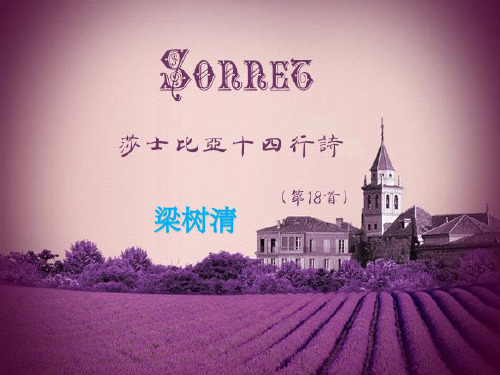
f
13 So long as men can breathe or eyes can see, g
ห้องสมุดไป่ตู้
14 So long lives this, and this gives life to thee. g
.
Alliteration: “And” “And”, “By” “But”, “So” “So” Simile: “Shall I compare thee to a summer's day?” Metaphor: “And summer's lease hath all too short a date.” Personification: “Sometime too hot the eye of heaven shines” Hyperbole: “But thy eternal summer shall not fade”
Theme: love is the only thing that can conquer all the things in the
world and the beauty is the immortal thing that can never be replaced.
.
THANK YOU!
5 Sometime too hot the eye of heaven shines, c
6 And often is his gold complexion dimm'd;
d
7 And every fair from fair sometime declines, c
8 By chance, or nature's changing course, untrimm'd; d
sonnet 18 莎士比亚的作品《第十八行诗》赏析 英文版

The speaker of the poem opens with a question that is addressed to the beloved, "Shall I compare thee to a summer's day?" This question is comparing her to the summer time of the year. It is during this time when the flowers are blooming, trees are full of leaves, the weather is warm, and it is generally thought of as an enjoyable time during the year. The following eleven lines in the poem are also dedicated to similar comparisons between the beloved and summer days. In lines 2 and 3, the speaker explains what mainly separates the young woman from the summer's day: she is "more lovely and more temperate." (Line 2) Summer's days tend toward extremes: they are sometimes shaken by "rough winds" (line3) which happens and is not always as welcoming as the woman. However in line 4, the speaker gives the feeling again that the summer months are often to short by saying, "And summer抯lease hath too short a date." In the summer days, the sun, "the eye of heaven" (line 5), often shines "too hot," or too dim, "his gold complexion dimmed" (line 6), that is there are many hot days during the summer but soon the sun begins to set earlier at night because autumn is approaching. Summer is moving along too quickly for the speaker, its time here needs to be longer, and it also means that the chilling of autumn is coming upon us because the flowers will soon be withering, as "every fair from fair sometime declines." (Line 7) The final portion of the sonnet tells how the beloved differs from the summer in various respects. Her beauty will be one that lasts forever, "Thy eternal summer shall not fade." (Line 9), and never end or die. In the couplet at the bottom, the speaker explains how that the beloved's beauty will accomplish this everlasting life unlike a summer. And it is because her beauty is kept alive in this poem, which will last forever. It will live "as long as men can breathe or eyes can see." (Line 13)On the surface, the poem is on the surface simply a statement of praise about the beauty of the beloved woman and perhaps summer to the speaker is sometimes too unpleasant with the extremes of windiness and heat that go along with it. However, the beloved in the poem is always mild and temperate by her nature and nothing at all like the summer. It is incidentally brought to life as being described as the "eye of heaven" with its "gold complexion". The imagery throughout the sonnet is simple and attainable to the reader, which is a key factor in understanding the poem. Then the speaker begins to describe the summer again with the "darling buds of May" giving way to the " summer’s lease", springtime moving into the warmth of the summer. The speaker then starts to promise to talk about this beloved, that is so great and awing that she is to live forever in this sonnet. The beloved is so great that the speaker will even go as far as to say that, "So long as men breathe, or eyes can see," the woman will live. The language is almost too simple when comparing it to the rest of Shakespeare’s sonnets; it is not heavy with alliteration or verse, and nearly every line is its own self-contained clause, almost every line ends with some punctuation that effects a pause. But it is this that makes Sonnet18 stand out for the rest in the book. It is much more attainable to understand and it allows for the reader to fully understand how great this beloved truly is because she may live forever in it. An important theme of the sonnet, as it is an important theme throughout much of the poetry in general, is the power of the speaker's poem to defy time and last forever. And so by doing this it is then carrying the beauty of the beloved down to future generations and eventuallyfor al of eternity. The beloved's "eternal summer" shall not fade precisely because it is embodied in the sonnet: "So long as men can breathe or eyes can see," (line 13) the speaker writes in the couplet, "So long lives this, and this gives life to thee."(Line 14) With this the speaker is able to accomplish what many have done in poetry and that is to give the gift of an eternal life to someone that they believe is special and outshines everyone else around them. Perhaps it is because of a physical beauty that the speaker see, but I believe that it is more because of the internal beauty as seen in line 2, "Thou art more lovely and more temperate", that the beloved is deserving to live on forever.。
完整word版,Sonnet18(英文赏析)
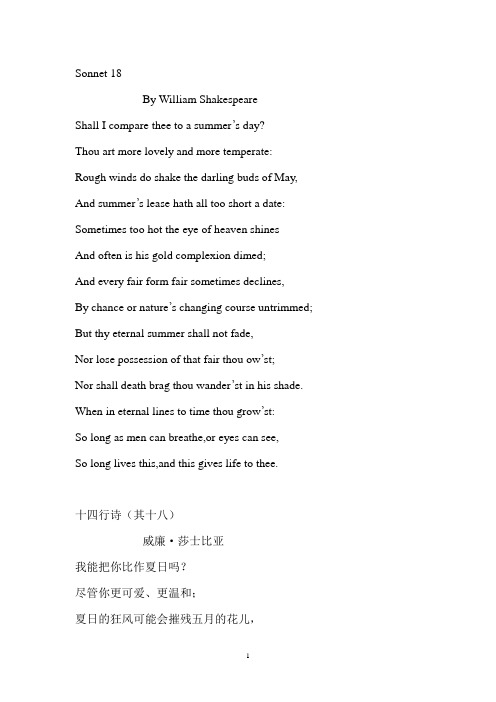
Sonnet 18By William ShakespeareShall I compare thee to a summer’s day?Thou art more lovely and more temperate: Rough winds do shake the darling buds of May, And summer’s lease hath all too short a date: Sometimes too hot the eye of heaven shinesAnd often is his gold complexion dimed;And every fair form fair sometimes declines,By chance or nature’s changing course untrimmed; But thy eternal summer shall not fade,Nor lose possession of that fair thou ow’st;Nor shall death brag thou wander’st in his shade. When in eternal lines to time thou grow’st:So long as men can breathe,or eyes can see,So long lives this,and this gives life to thee.十四行诗(其十八)威廉·莎士比亚我能把你比作夏日吗?尽管你更可爱、更温和;夏日的狂风可能会摧残五月的花儿,季节的限制又减少了可拥有的日光;天空的巨眼有时过于灼热,常使自身的辉煌无故湮没;每一种美都会消逝,不管愿意或是无奈;然而你这盛夏将永存不朽,连你所有的美都不会褪去;死神不忍逼近,生命只会长存;只要人类能呼吸,能看见;我的诗就会存在,而你的生命也会延续。
莎士比亚十四行诗第十八首的英文评论和赏析[珍藏版】

莎士比亚十四行诗第十八首的英文评论和赏析18 18我是否可以把你比喻成夏天?Shall I compare thee to a summer's day?虽然你比夏天更可爱更温和:Thou art more lovely and more temperate:狂风会使五月娇蕾红消香断,Rough winds do shake the darling buds of May,夏天拥有的时日也转瞬即过;And summer's lease hath all too short a date:有时天空之巨眼目光太炽热,Sometime too hot the eye of heaven shines,它金灿灿的面色也常被遮暗;And often is his gold complexion dimmed, 而千芳万艳都终将凋零飘落,And every fair from fair sometime declines,被时运天道之更替剥尽红颜;By chance, or nature's changing course untrimmed:但你永恒的夏天将没有止尽,But thy eternal summer shall not fade,你所拥有的美貌也不会消失,Nor lose possession of that fair thou ow'st,死神终难夸口你游荡于死荫,Nor shall death brag thou wander'st in his shade,当你在不朽的诗中永葆盛时;When in eternal lines to time thou grow'st,只要有人类生存,或人有眼睛,So long as men can breathe, or eyes can see,我的诗就会流传并赋予你生命。
So long lives this, and this gives life to thee.注:第11行语出《旧约•诗篇》第23篇第4节:“虽然我穿行于死荫之幽谷,但我不怕罹祸,因为你与我同在……”英文赏析:This is one of the most famous of all the sonnets, justifiably so. But it would be a mistake to take it entirely in isolation, for it links in with so many of the other sonnets through the themes of the descriptive power of verse; the ability of the poet to depict the fair youth adequately, or not; and the immortality conveyed through being hymned in these 'eternal lines'. It is noticeable that here the poet is full of confidence that his verse will live as long as there are people drawing breath upon the earth, whereas later he apologises for his poor wit and his humble lines which are inadequate to encompass all the youth's excellence. Now, perhaps in the early days of his love, there is no such self-doubt and the eternal summer of the youth is preserved forever in the poet's lines. The poem also works at a rather curious level of achieving its objective through dispraise. The summer's day is found to be lacking in so many respects (too short, too hot, too rough, sometimes too dingy), but curiously enough one is left with the abiding impression that 'the lovely boy' is in fact like a summer's day at its best, fair, warm, sunny, temperate, one of the darling buds of May, and that all his beauty has been wonderfully highlighted by the comparison。
sonnet18 的英文赏析(部分)
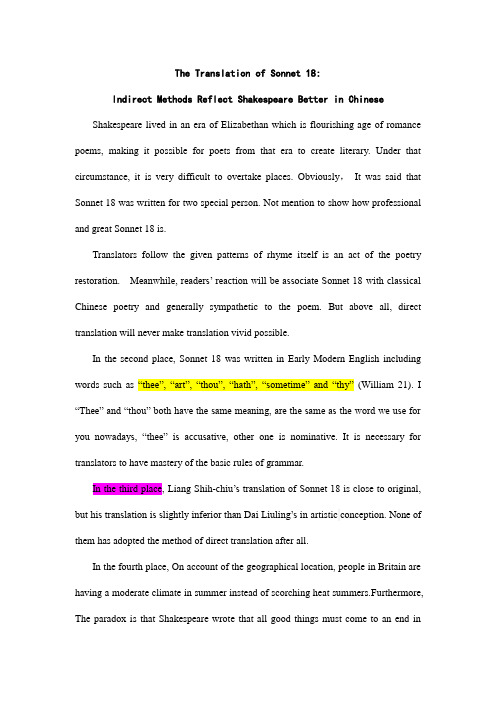
The Translation of Sonnet 18:Indirect Methods Reflect Shakespeare Better in Chinese Shakespeare lived in an era of Elizabethan which is flourishing age of romance poems, making it possible for poets from that era to create literary. Under that circumstance, it is very difficult to overtake places. Obviously,It was said that Sonnet 18 was written for two special person. Not mention to show how professional and great Sonnet 18 is.Translators follow the given patterns of rhyme itself is an act of the poetry restoration. Meanwhile, readers’ reaction will be associate Sonnet 18 with classical Chinese poetry and generally sympathetic to the poem. But above all, direct translation will never make translation vivid possible.In the second place, Sonnet 18 was written in Early Modern English including words such as “thee”, “art”, “thou”, “hath”, “sometime” and “thy”(William 21). I “Thee” and “thou” both have the same meaning, are the same as the word we use for you nowadays, “thee” is accusative, other one is nominative. It is necessary for translators to have mastery of the basic rules of grammar.In the third place, Liang Shih-chiu’s translation of Sonnet 18 is close to original, but his translation is slightly inferior than Dai Liuling’s in artistic conception. None of them has adopted the method of direct translation after all.In the fourth place, On account of the geographical location, people in Britain are having a moderate climate in summer instead of scorching heat summers.Furthermore, The paradox is that Shakespeare wrote that all good things must come to an end inline 7, line 8 is actually doing matting to the next lines,.In the eyes of Shakespeare, there is no doubt that “thou” will s pread through the ages just like what he wrote in his las t two lines are expressed by “men can breathe”, “eyes can see” (William 21).In the fifth place, Sonnet 18 is not perfect despite its classic, indirect translation is a vital part during propagation. Most of the college student s don’t appreciate Sonnet 18 based on teaching investigation. It is normal that classical poetry are n’t popular, but it is vain to ascribe this phenomenon to readers or the society. Few people can look again for the classical poetry. However, flaws in text itself maybe the reason why they are unpopular. On the one hand, although Sonnet 18 consists of three quatrains and a couplet, the rhyme isn’t neat. The stress placement of the end rhyme are difference, despite “temperate” in line 2 and “date” in line 4 are end with “ate”. Compared with the other lines, this rhyme is abrupt. The two “ands” in the beginning of line 6 and line 7 should function as a progressive alliteration rather than a parallel one. Meter, rhyme and stanza, in the right hands, can be inescapably precise as to tone, rhythm, emphasis and the stages of the argument. Shakespeare was overdoing it in Sonnet 18, it’s disrupted the form of Sonnet 18 and fragmented the melody and rhythm. All these factors had negative impact on Sonnet 18. Actually, the readers foun d that difficult to read bumpy sentences. On the other hand, “And every fair from fair sometime declines”(William 21) was written in obscure way that readers may feel abstract. “Summer” has a lease but the lease is short, from “And summer’s lease hath all too short a date” (William 21) in line 4. The sheer aesthetics that Shakespeare goes for in some ways readers may feel strange. There were anthropomorphic, forexample, “death” doesn’t exist, not to mention that it could brag, but this descriptive method is commonplace for such a classical poem. It is a truth acknowledged by anyone that life is short and time is swift, simple truth are told in the presentation of complex information, readers may not feel cordiality and geniality. Indirect translation can put original version into a band new one, to avoid this situation and make the work get better and better, especially be particularly important for readers under this circumstances. Direct translation will never make that happen and only make matters worse.When I learnt an ancient poem as a pupil, I wasn’t learning at the right level, I just learnt the words, not the message, then I asked my teacher for help. My teacher Would told me about the profound intent. When I read a poem, especially the translatio n, it’s not just about the literal meaning, I want to know the inner meaning of it, including its cultural background, historical origin and so on. After reading, I must learn some new knowledge, that’s the meaning of reading. Indirect translation is like my teacher, making my read smoothly and understandingly.Sonnet 18 is one of the most beautiful sonnets written by Shakespeare. In this sonnet, the poet writes beautifully on the conventional theme that his poetry will bring eternity to the one he loves a nd eulogizes. However, it’s more than that.Conceptual Blending Theory is used in this paper to analyze why literal translation and liberal translation arise in translation. It points out that, when translating the rhetorical devices in English titles, both translational equivalence and functional equivalence can be taken as the criteria.。
Sonnet 18 赏析
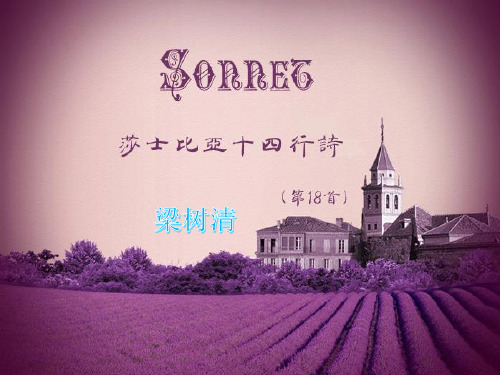
e
f
11 Nor shall Death brag thou wander'st in his shade,e 12 When in eternal lines to time thou grow'st. 13 So long as men can breathe or eyes can see, 14 So long lives this, and this gives life to thee. f g g
Alliteration: “And” “And”, “By” “But”, “So” “So”
Simile: “Shall I compare thee to a summer's day?” Metaphor: “And summer's lease hath all too short a date.” Personification: “Sometime too hot the eye of heaven shines” Hyperbole: “But thy eternal summer shall not fade”
Theme: love is the only thing that can conquer all the things in the
world and the beauty is the immortal thing that can neverYOU!
6 And often is his gold complexion dimm'd;
7 And every fair from fair sometime declines,
Sonnet 18英文赏析
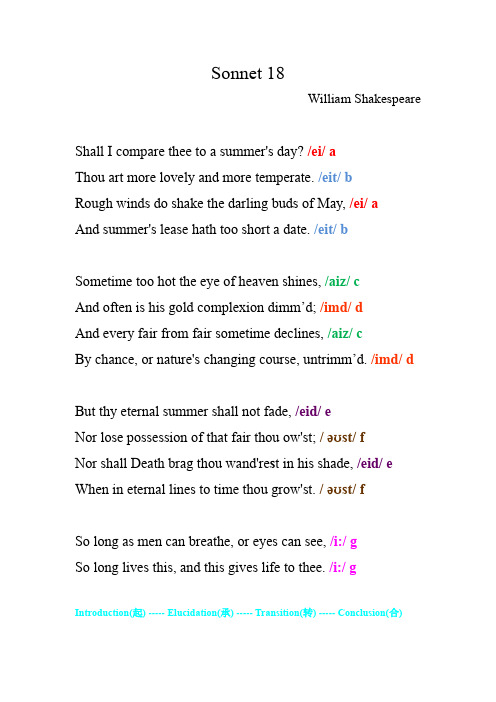
Sonnet 18William ShakespeareShall I compare thee to a summer's day? /ei/ aThou art more lovely and more temperate. /eit/ bRough winds do shake the darling buds of May, /ei/ aAnd summer's lease hath too short a date. /eit/ bSometime too hot the eye of heaven shines, /aiz/ cAnd often is his gold complexion dimm’d; /imd/ dAnd every fair from fair sometime declines, /aiz/ cBy chance, or nature's changing course, untrimm’d. /imd/ dBut thy eternal summer shall not fade, /eid/ eNor lose possession of that fair thou ow'st; /əʊst/ fNor shall Death brag thou wand're s t in his shade, /eid/ e When in eternal lines to time thou grow'st. / əʊst/ fSo long as men can breathe, or eyes can see, /i:/ gSo long lives this, and this gives life to thee. /i:/ gIntroduction(起) ----- Elucidation(承) ----- Transition(转) ----- Conclusion(合)Sonnet 18 is one of the best-known of 154 sonnets written by the English playwright and poet William Shakespeare.From phonological level, the poem consists of 14 lines, three quatrains followed by a couplet.Each line in this sonnet contains ten syllables and is written in iambic pentameter, in which each line has five feet, in other words, a pattern of an unstressed syllable followed by a stressed syllable is repeated five times. For example, the first line can be divided into five independent feet as “Shall I / compare / thee to/ a sum/mer's day”with stresses on I, -pare, to, sum-, day respectively.The rhyme scheme of this poem is a-b-a-b, c-d-c-d, e-f-e-f, g-g. The last word of line 1 “day” and that of line 3 “May” have the same end rhyme: /ei/; line 2 and line 4 rhyme with /eit/. These four lines form a quatrain. Similarly, the four lines from line 5 to line 8 form the second quatrain, and line 9 to line 12 the third quatrain. However, the last two lines have the end rhyme:/i:/ and form a couplet. Usually, a theme (problem, situation or idea) is developed and elaborated in the quatrains and a concluding thought (solution, comment or summary) is presented in the couplet. The 7 rhymes throughout the poem contribute to therealization of textual coherence by phonological cohesion.Line 6 and line 7 begin with the same word “And”; line 10 and line 11 “Nor”; the last two lines “So”. The repetition of the first word can enhance the strength of the poem. For instance, the repetition of “So” strengthens the eternity of beauty.The poem inline has alliteration ( “shall” and “summer” in line 1, “do” and “darling” in line3, “summer” and “short” in line 4, “chance” and “changing” in line 8, “shall” and “shade” in line 11, and “long”, “lives” and “life” in the lastl line ), assonance (“or” and “course” in line 8, “but” and “summer” in line 9, and “lines”and “time” in line 12) and rhyme(“winds” and “buds”in line 3, “chance” and “course” in line 8, “lives” and “gives” , and “this” and “thee”in the last line). All these not only reflect the formal beauty of poetry, but also embody the beauty of vocal range and phonological harmony.From lexical level, old words are used in this sonnet. For example, thee=you(宾格), thou=you(主格), thy=your, art=are, hath=has, sometime=sometimes.From the rhetorical perspective,some figures of speech are in use in this sonnet like simile(thee—a summer’s day), metaphor(summer’s duration—a lease, the sun—the eye of heaven), personification(summer—has a short lease, sun— has golden complexion, death—brag thee in his shade, poem—gives life to thee), inversion(line 11,line 14), rhetoric question(line 1) , exaggeration(the eternal summer, line 11), pun(line 7) and paradox.From the perspective of content and structure, line 1—2 are proposal; line 3—12 are argument; line 13—14 are conclusion. In the first two lines of the poem, the speaker compares his beloved to the summer season, in the form of a flattering rhetoric question to the beloved and a firm answer that his beloved is better, more beautiful and less extreme than summer. Summer is chosen as the comparison target because in England, summer is not hot but comfortably warm and it is the most pleasant season of the year. In addition, summer stands for youthfulness. Then the next six lines list some negative things about summer: the wind is too strong—“Rough winds do shake the darling buds of May” ; summer is short—"summer's lease hath all too short a date", and sometimes the sun is toohot—"Sometime too hot the eye of heaven shines." However, the beloved has beauty that will last forever, unlike the fleeting beauty of a summer's day. By putting his love's beauty into the form of poetry, the poet is preserving it forever. The lover's beauty will live on, through the poem which will last as long as it can be read. He also states that his beloved will live on forever through the words of the poem.From the thematic level, see from the shallow layer, the poem is simply to praise the beauty of the beloved. While in a deep sense, it expresses that the beauty in nature is transient, such as a nice summer’s day, while the art in general (poetry in particular) is immortal. Shakespeare has a resolute faith that poetry can defy time and last forever.。
《Sonnet18赏析》
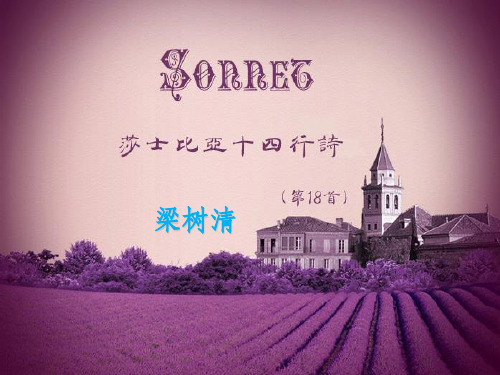
整理课件
1
1 Shall I /compare /thee to/ a sum/mer's day? a 2 Thou art/ more love/ly and /more tem/perate. b
3 Rough winds do shake the darling buds of May,a
8 By chance, or nature's changing course, untrimm'd; d
9 But thy eternal summer shall not fade,
e
10 Nor lose possession of that fair thou ow'st.
f
11 Nor shall Death brag thou wander'st in his shade,e
整理课件
4
感谢亲观看此幻灯片,此课件部分内容来源于网络, 如有侵权请及时联系我们删除,谢谢配合!
12 When in eternal lines to time thou grow'st.
f
13 So long as men can breathe or eyes can see, g
14 So long lives this, and this gives life to thee. g
整理课件
4 And summer's lease hath all too short a date. b
5 Sometime too hot the eye of heaven shines, c
6 And is his gold complexion dimm'd;
- 1、下载文档前请自行甄别文档内容的完整性,平台不提供额外的编辑、内容补充、找答案等附加服务。
- 2、"仅部分预览"的文档,不可在线预览部分如存在完整性等问题,可反馈申请退款(可完整预览的文档不适用该条件!)。
- 3、如文档侵犯您的权益,请联系客服反馈,我们会尽快为您处理(人工客服工作时间:9:00-18:30)。
The Translation of Sonnet 18:Indirect Methods Reflect Shakespeare Better in Chinese Shakespeare lived in an era of Elizabethan which is flourishing age of romance poems, making it possible for poets from that era to create literary. Under that circumstance, it is very difficult to overtake places. Obviously,It was said that Sonnet 18 was written for two special person. Not mention to show how professional and great Sonnet 18 is.Translators follow the given patterns of rhyme itself is an act of the poetry restoration. Meanwhile, readers’ reaction will be associate Sonnet 18 with classical Chinese poetry and generally sympathetic to the poem. But above all, direct translation will never make translation vivid possible.In the second place, Sonnet 18 was written in Early Modern English including words such as “thee”, “art”, “thou”, “hath”, “sometime” and “thy”(William 21). I “Thee” and “thou” both have the same meaning, are the same as the word we use for you nowadays, “thee” is accusative, other one is nominative. It is necessary for translators to have mastery of the basic rules of grammar.In the third place, Liang Shih-chiu’s translation of Sonnet 18 is close to original, but his translation is slightly inferior than Dai Liuling’s in artistic conception. None of them has adopted the method of direct translation after all.In the fourth place, On account of the geographical location, people in Britain are having a moderate climate in summer instead of scorching heat summers.Furthermore, The paradox is that Shakespeare wrote that all good things must come to an end inline 7, line 8 is actually doing matting to the next lines,.In the eyes of Shakespeare, there is no doubt that “thou” will s pread through the ages just like what he wrote in his las t two lines are expressed by “men can breathe”, “eyes can see” (William 21).In the fifth place, Sonnet 18 is not perfect despite its classic, indirect translation is a vital part during propagation. Most of the college student s don’t appreciate Sonnet 18 based on teaching investigation. It is normal that classical poetry are n’t popular, but it is vain to ascribe this phenomenon to readers or the society. Few people can look again for the classical poetry. However, flaws in text itself maybe the reason why they are unpopular. On the one hand, although Sonnet 18 consists of three quatrains and a couplet, the rhyme isn’t neat. The stress placement of the end rhyme are difference, despite “temperate” in line 2 and “date” in line 4 are end with “ate”. Compared with the other lines, this rhyme is abrupt. The two “ands” in the beginning of line 6 and line 7 should function as a progressive alliteration rather than a parallel one. Meter, rhyme and stanza, in the right hands, can be inescapably precise as to tone, rhythm, emphasis and the stages of the argument. Shakespeare was overdoing it in Sonnet 18, it’s disrupted the form of Sonnet 18 and fragmented the melody and rhythm. All these factors had negative impact on Sonnet 18. Actually, the readers foun d that difficult to read bumpy sentences. On the other hand, “And every fair from fair sometime declines”(William 21) was written in obscure way that readers may feel abstract. “Summer” has a lease but the lease is short, from “And summer’s lease hath all too short a date” (William 21) in line 4. The sheer aesthetics that Shakespeare goes for in some ways readers may feel strange. There were anthropomorphic, forexample, “death” doesn’t exist, not to mention that it could brag, but this descriptive method is commonplace for such a classical poem. It is a truth acknowledged by anyone that life is short and time is swift, simple truth are told in the presentation of complex information, readers may not feel cordiality and geniality. Indirect translation can put original version into a band new one, to avoid this situation and make the work get better and better, especially be particularly important for readers under this circumstances. Direct translation will never make that happen and only make matters worse.When I learnt an ancient poem as a pupil, I wasn’t learning at the right level, I just learnt the words, not the message, then I asked my teacher for help. My teacher Would told me about the profound intent. When I read a poem, especially the translatio n, it’s not just about the literal meaning, I want to know the inner meaning of it, including its cultural background, historical origin and so on. After reading, I must learn some new knowledge, that’s the meaning of reading. Indirect translation is like my teacher, making my read smoothly and understandingly.Sonnet 18 is one of the most beautiful sonnets written by Shakespeare. In this sonnet, the poet writes beautifully on the conventional theme that his poetry will bring eternity to the one he loves a nd eulogizes. However, it’s more than that.Conceptual Blending Theory is used in this paper to analyze why literal translation and liberal translation arise in translation. It points out that, when translating the rhetorical devices in English titles, both translational equivalence and functional equivalence can be taken as the criteria.。
